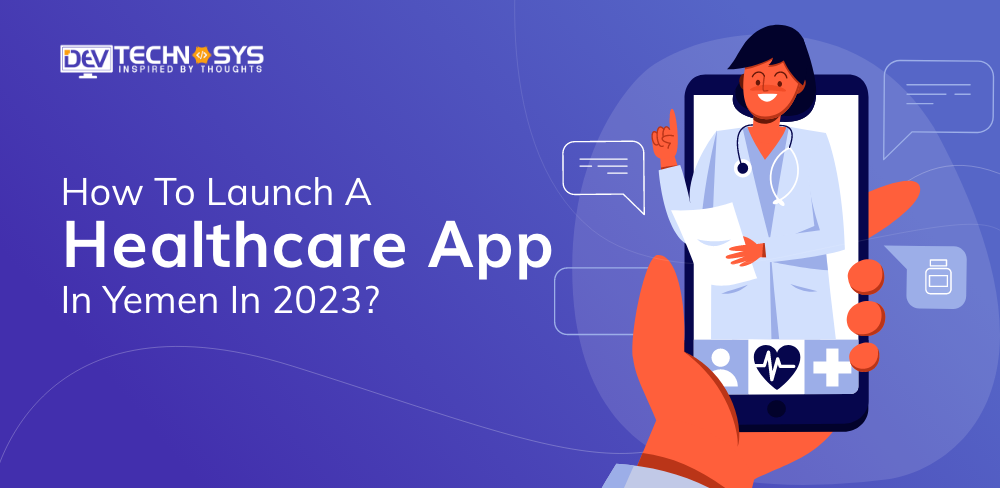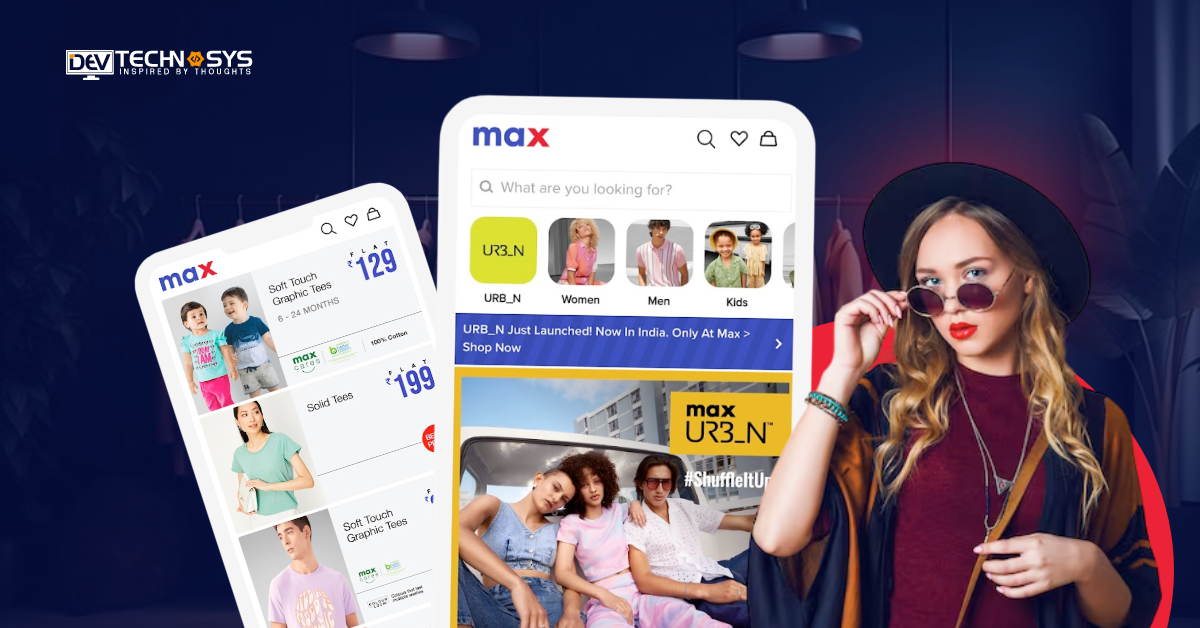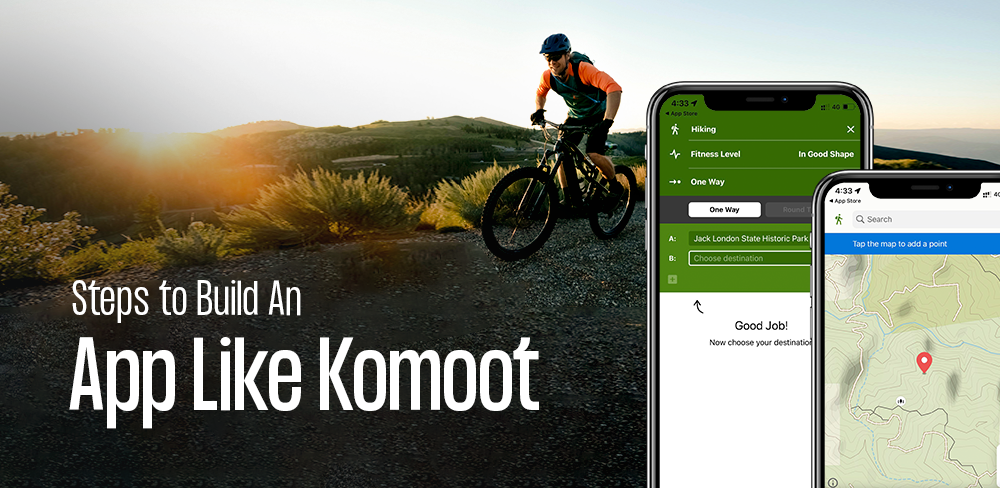Are you looking to launch a healthcare app in Yemen? Then you have reached the correct place. The digitization of healthcare makes healthcare more affordable and accessible to all, particularly to those in the most vulnerable parts of the globe.
The current pandemic has made medical technology even more important and evident. This allowed the market to expand and grow to meet the growing demand.
Healthcare apps connect doctors and patients, and provide easy communication channels. The technology allows doctors to diagnose and treat more accurately, while patients can access professional medical care from the comfort of their own homes.
However, building a medical app requires a lot more than just technical and legal knowledge. It also needs lots of planning and skilled human resources.
This blog will discuss various types of healthcare apps and how they can be beneficial to both patients and doctors. We’ll also discuss the core features, and take a look at the final guide to build healthcare software and costs.
Healthcare Industry Market Stats
- In 2022, the market for healthcare application development was estimated to be worth USD 43.5 billion. From 2023 and 2030, it is anticipated to expand at a compound annual rate (CAGR of 11.6%).
- By 2023, it is anticipated that the HealthCare segment’s sales would total US$17.03 billion.
- The revenue is anticipated to increase by 12.90% annually (CAGR 2023–2027), with a market size of US$27.67 billion in 2027 as a consequence.
- China is the company’s main source of income, with a market volume expected to reach US$19.940.00m by 2023.
- By 2027, 84.37 million people are projected to be a part of the health care segment.
- User penetration will be 21.7% in 2023. In 2027, it is anticipated to increase to 24.3%.
- The average revenue per user (ARPU) is anticipated to be $231.10 US.
What is a Healthcare App?
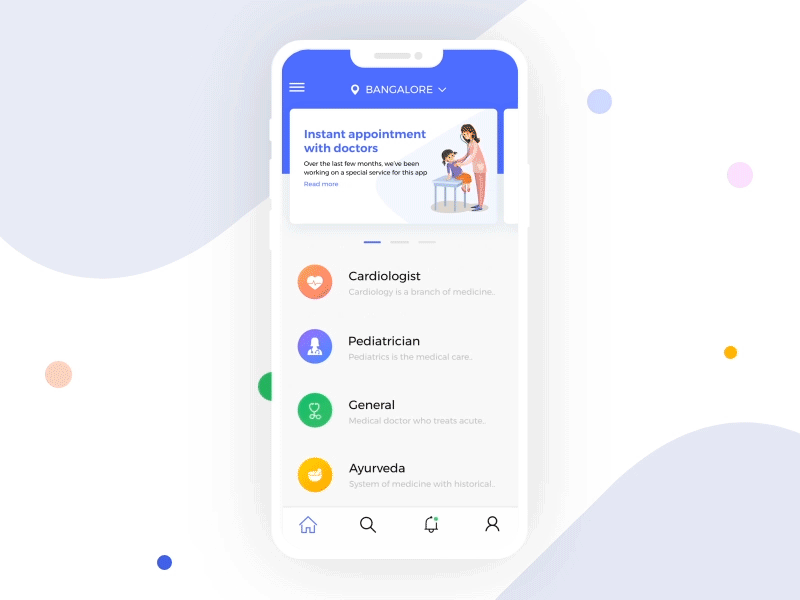
A healthcare app is software designed for mobile devices. It allows users to monitor and send data about their health. Users can maintain electronic records of their health and obtain medical advice using apps for healthcare. (EHRs). They can also be used to submit insurance claims.
The healthcare mobile application allows you to monitor important health metrics. These include calorie intake, physical exercise, blood pressure, blood sugar, and other important health metrics.
Why Should You Invest in a Healthcare App?
A wide range of reasons should lead businesses to invest in a Healthcare App In Yemen. A healthcare app can be a great tool for businesses to improve their employees’ health and productivity.
This can result in increased productivity, lower absenteeism, and lower healthcare expenses. Businesses can provide employees with tools and resources that help them manage their health and make lifestyle changes.
A healthcare app is not only a great tool to improve employee health but it can also help customers build brand loyalty and engage with them. A healthcare app can allow customers to book appointments, refill prescriptions, and access other health-related information and resources.
Businesses can offer these services via a mobile application to create a more personalized and convenient experience for customers. This can assist them to be unique from their competitors.
However, healthcare apps can be an invaluable source of information and insight for businesses. Businesses can gather valuable information about user behavior, preferences and health outcomes to gain valuable insight into customers’ needs and preferences.
This can be used to inform product development and marketing strategies as well as other business decisions. Thus, these are the reasons to invest in healthcare mobile apps.
Benefits of Healthcare Apps For Doctors And Patients
To launch a healthcare app in Yemen, you must consider its benefits. The apps help patients and providers in a variety of ways. Additionally, it supports the expansion of the complete healthcare sector. Let’s examine a few advantages that specialized healthcare applications can provide.
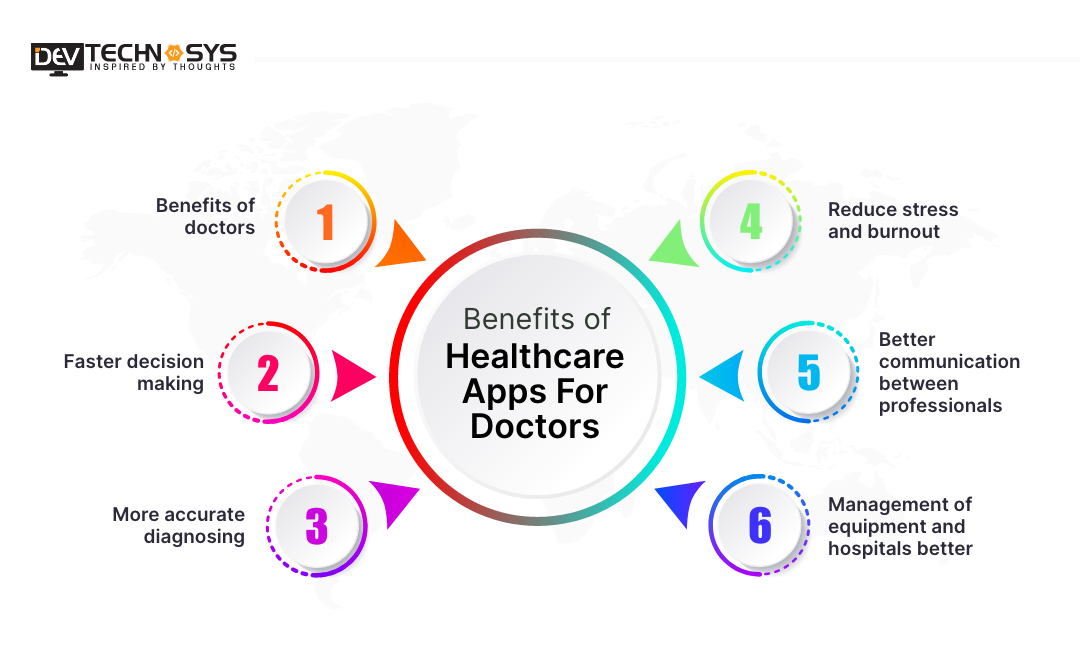
1. Benefits of doctors
A health app’s development might take a lot of time, money, and resources. How can we demonstrate its worth to stakeholders and investors?
2. Faster decision making
The length of time that doctors can spend with patients and the total amount of help they can give has increased.
3. More accurate diagnosing
This implies that you’ll get better treatment programs and quicker access to healthcare.
4. Reduce stress and burnout
Software lessens the workload for physicians and improves the effectiveness of the healthcare system. It is incredible how reducing paperwork can boost medical staff happiness.
5. Better communication between professionals
Regardless of their location, doctors can confer with one another using telemedicine platforms.
6. Management of equipment and hospitals better
Health communities may track and maximize the use of their equipment thanks to IoT and other technologies. The healthcare mobile app development services providers can develop a mobile software that will enable hospitals to keep track of every ventilator present.
These benefits all add up to lower healthcare costs.
Benefits for Patients
The role of mobile apps in the healthcare industry is very vast. It reduces the operational cost and so on. So let’s not overlook the numerous advantages that patients receive in order to launch a healthcare app in yemen.
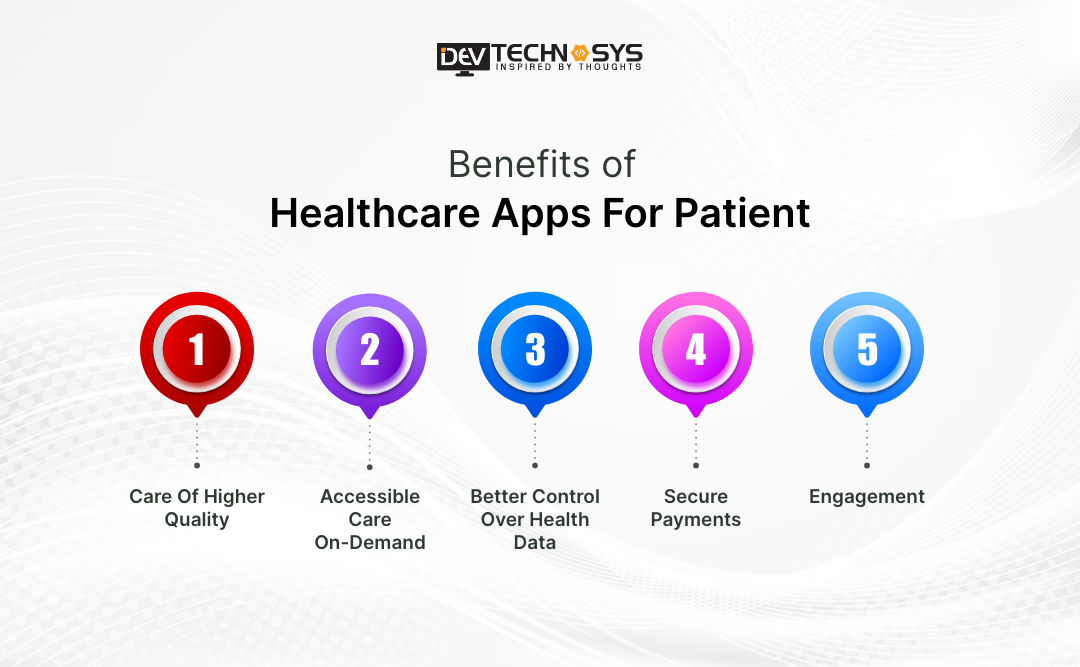
1. Care of higher quality
All the automations at their disposal allow patients to receive individualized wellness programs that are catered to their unique requirements.
2. Accessible care on-demand
The healthcare mobile app development platform allows you to access some healthcare services as if it were possible to order sushi or rent an apartment on Airbnb. This also entails that healthcare services are delivered faster, like remote consultations and med delivery.
3. Better control over health data
Patients have the option to export their medical records and share them at other institutions. You can take help from android application development services who can launch a healcater app in yemen.
4. Secure payments
It is a great idea to make in-app payments using credit cards. This can also be done during the development of medical applications.
5. Engagement
Finally, eHealth advanced technologies encourage active patient participation and provide patients more control over their care.
Different Types of Healthcare Apps
Healthcare mobile apps can be classified into five main categories. There are many types of healthcare mobile apps, but we will only focus on the most important parent categories to see how they work to develop a healthcare app.
1. ER/Urgent Care Apps
This app helps patients find the most cost-effective and nearest emergency room. It also gives users directions, travel time and waiting periods, as well as insurance options.
2. Apps to Maintain a Healthy Lifestyle
These apps are often used to educate patients and keep them on track for their appointments. Apps that track diets, practice intermittent fasting, promote healthy eating, provide exercise instructions, and keep track of one’s fitness are all included in this category.
3. General Hospital Apps
Mobile apps for hospitals can highlight branding and messaging. These apps can showcase branding and messaging. A general hospital app could be enhanced with a booking feature for doctor appointments. You could also create a doctor appointment scheduling application.
4. Apps for Clinical & Diagnosis Assistant
These apps often provide access to personal health records, such as electronic charts, digital imaging (Xray), lab results details and information, and possible symptoms. A telehealth app can be used to perform a clinical diagnosis. These apps were in high demand following the pandemic.
5. Apps for Medication Tracking
This app encourages patients to follow their prescribed regimen by keeping track of their doses, time intervals, meals, as well as reminding them to take their medicine on time. These medication tracking apps, as you can see in the Echo example above, are one of the most useful and effective healthcare apps.
What Key Features are Required to Launch a Healthcare App in Yemen?
A minimum viable product (or MVP) is a proof of concept. Companies create MVPs to validate their ideas, gather feedback, and then rethink the concept. This section will center on the essential attributes that a MVP for a health app needs.
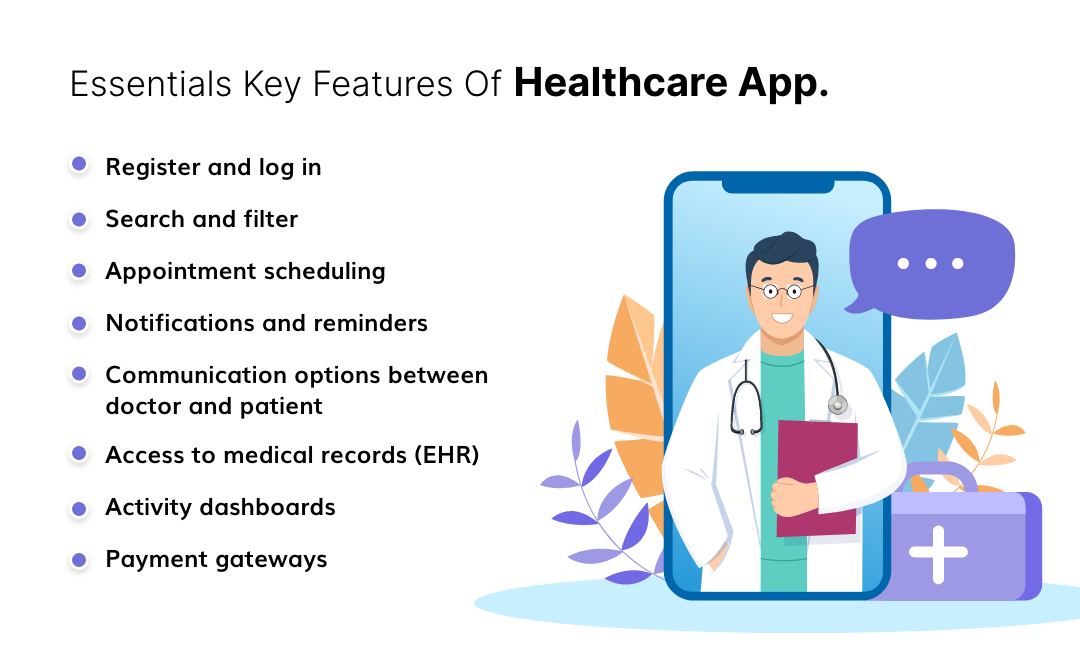
1. Register and log in
To create a profile, users will need to register. This step should be secure and provide top-notch data protection with two-factor authentication (and data encryption).
2. Search and filter
Your application should allow users to search for specific hospitals or medical experts. Filter options allow for a more precise search. They include details such as location, insurance provider and area of expertise.
3. Appointment scheduling
Create an easy-to use appointment scheduling system for patients and doctors that allows them to manage their schedules. Provide slots for users to choose from, and then confirm with the doctor.
4. Notifications and reminders
Apps that manage medication and appointments should be able to enable and personalize notifications. To integrate this feature in your app, you must hire an IoT app development company.
5. Communication options between doctor and patient
Different communication preferences may exist for patients, such as messaging, chats, or audio calls. These communication channels may contain confidential information that can’t be leaked, so it is important to protect them.
6. Access to medical records (EHR)
A medical app must have secure storage and sharing options for electronic records. A health app should be available to both doctors and patients so that they can access the files whenever needed.
7. Activity dashboards
Dashboards give a comprehensive overview of a patient’s medical history and data. Physicians can quickly access the most important information during a visit or online session without having to scroll through patient records.
8. Payment gateways
To make your app more accessible to many users, you should offer several payment options. Based on your target audience, you can include credit and debit cards, Stripe, PayPal, and other payment options.
Advanced Features in a Healthcare App
After you have launched your MVP and gotten feedback, you can move on to the next steps to launch a healthcare app in yemen to integrate more advanced features to make your solution stand out in the market.
1. Geolocation
Geolocation lets users share their location with their app to instantly find doctors and healthcare organizations near them. The app can also be used to instantly help patients who need immediate medical attention. To integrate this feature in your app, hire a hybrid app development company.
2. Reviews & feedback
This feature allows users to find the right medical professional for them based on their values and past medical history. You can search through reviews to find the best expert for you. Patients can leave reviews and positive or negative feedback to help promote good doctors.
3. Symptom checker
To get the best medical advice, users can enter information about their symptoms. Instead of searching Google for information and reading unreliable blog posts, users will be able to access curated, current medical information provided by professionals. This feature may also include AI chatbots, which gather initial information and then refer the user to a specific doctor.
4. Integration with wearables
IoT devices provide endless opportunities for medical professionals and help make diagnosis more accurate and data-driven. Wearables allow users to monitor their health and enable doctors to track their overall condition and treatment plan.
5. ePrescription
A medical app allows for the creation of electronic prescriptions. These prescriptions can either be delivered to the patient or sent straight to a pharmacy where the patient can pick up their medication.
6. Education in health
Your users should have access to medical education materials that will help them learn more about their condition as well as the most recent developments in this field. Doctors will need access to studies and medical research, while patients will gain from general knowledge and snippets.
Steps to Launch a Healthcare App in Yemen
Now the main question arises “how to make a healthcare app”. It is hard to design an application for healthcare without a comprehensive grasp of the app’s aims, attributes, and functions. Choosing the right app kind, target market, problems to solve, and method for doing so are crucial decisions. This section will cover each step to launch a healthcare app in yemen.
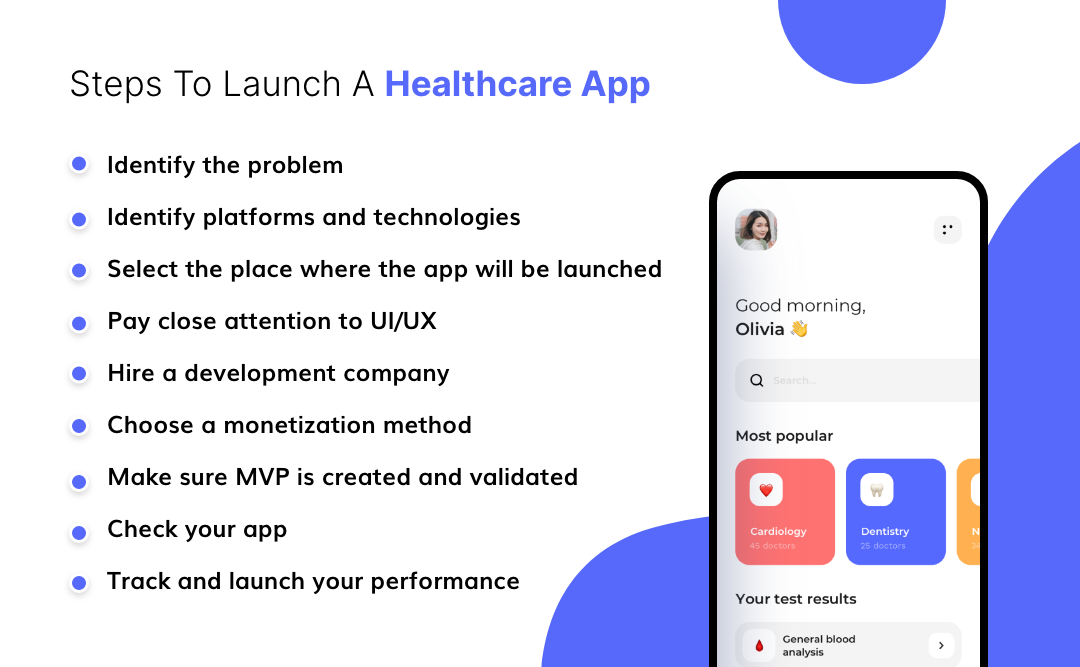
Step 1: Identify the problem
Understanding the needs of end-users is essential to launch a healthcare app in yemen. Understanding the issues they face in existing solutions and how your app can help them is an important part of the healthcare app development process.
To be as precise as possible, define the user persona and determine if they are willing to adopt your solution. It is a great idea to check out into the healthcare sector before you launch your app. Your application could be about anxiety-tracking or diabetes.
Step 2: Identify platforms and technologies
The choice of platform your application will be available on is another important aspect to launch a healthcare app in yemen. This could be Android, iOS or web. To ensure your application is always available via voice command, you can consider adding a home assistant integration to the mix.
It is important to remember that older patients prefer to visit websites, while younger patients are more comfortable using voice and app devices.
When deciding which platforms your application should be placed on, market research is a great tool. It is essential that all healthcare apps are interoperable in order for the app to be successful.
Step 3: Select the place where the app will be launched
Entrepreneurs, business leaders, and tech heads all follow the same approach when creating new apps. If you or your board members want to launch a healthcare app in Yemen and consider the country-specific issues and user persons, as well as the laws that govern the creation and deployment of medical apps.
Step 4: Pay close attention to UI/UX
The UI/UX design is a key component to launch a healthcare app in yemen. Generally speaking, older users prefer simple navigation and larger fonts. However, younger audiences prefer a vibrant user interface with better functionality and unique features.
Your audience will determine the design. This could be healthcare professionals, patients or the general population. It’s not only important to consider the visual aspect of the app, but also how it will look on different screen sizes.
This will depend on which platform you’re aiming for. Remember that the UI/UX design can make or break your product. So invest time and money accordingly.
Step 5: Hire a development company
The next step to launch a healthcare app in Yemen is to hire a development team. You can be sure that your app has all the latest functionalities and features by hiring a team of mobile app developers.
They will give you a complete idea on how to create a scalable, healthcare app. The following members will make up your mobile healthcare app development team:
- UI/UX designers
- healthcare application development company
- Testers
- Managers of projects
- Market specialists
These experts are able to offer expert advice and will always be open to your ideas. They have access to industry knowledge and the most recent technologies.
Step 6: Choose a monetization method
The next step is to launch a healthcare app in yemen. All applications have the same purpose, regardless of genre, which is to make money. When we think about how to make money with an app, there are two main types of models: Subscription-based model and Freemium model that allows paid access to premium services.
Step 7: Make sure MVP is created and validated
An MVP may be a major element of success. This lets you approve the solution before it goes on the market. Ask your on demand app development services provider to identify your key USPs and essential features and create an MVP.
MVP healthcare software development allows potential users to share their experiences with the app and tell you what functionality they would like to see added to it. However, investors will also be interested in your MVP if they see demand for it in the market.
Step 8: Check your app
When creating healthcare solutions, testing is a key step. The testers will test everything from content to user experience and interface. Testing will reduce development time and costs, identify bugs and improve your reputation as a service provider.
Step 9: Track and launch your performance
After your app has been successfully tested, the next step to launch a healthcare app in yemen is you can now welcome your users. Launch your app and use the in-app analytics tools to monitor its performance, address user requests and concerns, and provide updates to keep them engaged. This was the standard process for developing healthcare apps, but your app can be distinguished by its concept and the features it offers.
How Much does it Cost to Launch a Health App in Yemen
The costs of developing mobile apps for health vary depending on many factors. The average cost to build healthcare app runs at $25000-$50000. They can vary depending on where you are located, the app’s complexity, and the technology stack.
It is possible to save money by working with a third party agency instead of hiring an in-house staff. Although the costs of hiring freelancers are typically lower, there is still a chance of getting poor results.
Hidden costs can also add to the cost of your bill. Costs of tech support and content management tools are just two examples. However, you must considered hosting and server costs, as well as data storage/anonymizing costs. You will need to spend more for regular updates, feature releases, and the app’s release to the stores.
Conclusion
It is not an easy task to launch a healthcare app in yemen. The development of healthcare apps involves providing useful functionality that meets users’ requirements. A medical app should streamline the work of doctors and nurses.
It is possible to develop intuitive and reliable health solutions using the latest technologies. Therefore, a reliable mobile application development company can help you develop a healthcare solution.
FAQ
1. Which technology is the best for developing healthcare apps?
Flutter, Swift and Kotlin are the top mobile apps technologies to launch a healthcare app in yemen. It is advisable to consult your development team when choosing a technology stack. Your app requirements and budget will guide your healthcare app and hire dedicated developers to choose the right technology.
2. Why is it important for healthcare apps to comply with HIPAA?
It is a good idea to have your healthcare app comply with HIPAA if it collects, transfers, and manages protected healthcare information. This will ensure that medical information is secure and encrypted, and you can access by patients for research and diagnosis.
3. How do you launch a healthcare app in Yemen that is effective?
Apps that are successful will be built on collaboration and a product-oriented mindset. It is possible to launch a healthcare app in Yemen that works well and meets users’ needs by working closely with product, design, as well as development teams. Product mindset is also important. Thus, it helps you make smart business decisions and focuses on the customer.
4. What is the average time it takes to launch a healthcare app in yemen?
It takes approximately 5-6 months to launch a healthcare app in yemen depending on the details, such as the features and design, and the number of specialists involved in the process.









